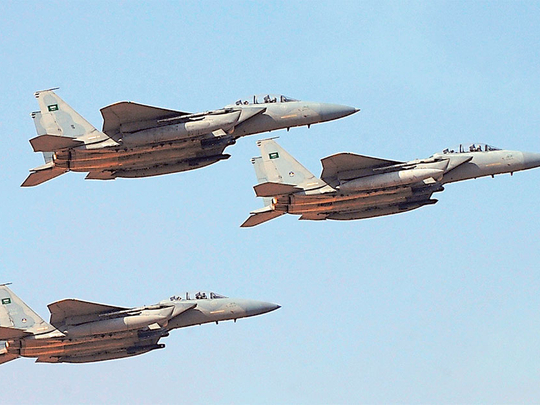
Dubai: The Saudi-led military operation in Yemen, which started in the early hours of Thursday in coordination with a coalition of 10 countries, sends a message to Iran, which supports Al Houthis, that this is the end of the its military and political influence in the Arab region, military experts said.
However, the operation against Yemen, which is one of the least developed countries in the world, can’t be ended with simply a military victory by one side. More steps, including political moves, are needed to cement the outcome of the military intervention, the experts added.
“I think the message [sent to Iran] is that the day of Iran moving with a free hand in the Arab world has come to an end from now on, and it [Iranian influence] will be challenged,” said Riyad Qahwaji, founder and head of Dubai-based Institute for Near East and Gulf Military Analysis.
Arab reaction to the Yemen chaos, which was close to civil war, has been awaited for “too long, [and] better later than never,” he added in an interview with Gulf News. However, the large size of the coalition and the participation of regional powers, namely the nuclear-power Pakistan, were not anticipated, Qahwaji said.
Saudi Arabian ambassador to Washington Adel Jubeir announced on early Thursday in local time the beginning of the Saudi-led operations in Yemen, dubbed Operation Storm of Resolve.
The military interview came after the besieged Yemeni government, which was toppled by the Houthi movement, called on neighbouring Arab Gulf countries to aid them against the Houthi movement, which is allied with Iran.
Al Houthis also received the support of some fighters and army units loyal to the former Yemeni president Ali Abdullah Saleh.
Few hours after the beginning of the operation, signs show “good results”, in terms of inflicting losses in the military capabilities of Al Houthis, said Cairo-based military expert Jamal Mazloum.
Before zero hour of the operation, Mazloum said, several high-level contacts were underway among the participating countries, and this explains the “surprising size and timing of the operation”, he explained to Gulf News.
Saudi Arabia felt concerned from the increasing influence of Al Houthis, supported by Iran, in neighbouring Yemen.
“The reach of Al Houthis to Bab Al Mandeb strait constitutes a threat to Saudi and there are concerns that Iran will eventually try to control the strait like it threatens to do with Hormuz Strait on the eastern side of the Gulf,” Mazloum added.
Both straits are considered among the top vital shipping lanes in the world.
Military enforcements were sent to Yemeni ports to further control the situation and to stop any possible armed aid sent to Al Houthis.
Military experts, meanwhile, differ in their expectations for the scenarios in the future.
While some, including Mazloum, expects a continuous air attacks for several days after which the ground battles will be including Yemeni tribes, others expect the coalition to win easily the ground battles, expected as to be second phase.
Qahwaji expects ground offences as part of the ongoing “conventional war… Al Houthis will lose very quickly the conventional confrontation because the alliance has the upper edge,” he added.
But, other experts expressed a different opinion.
“Today, temporary military victory is not important,” said Beirut-based Major-General Elias Hanna. “What is important in my opinion is that this victory is translated to a political one and to an accepted legitimacy,” added the military expert and lecturer.
He gave the situation in Syria as example of conflicts where military victories by the regime and opponents are not only the decisive factor.
“Look, the US is supporting the Iranian troops in Tikrit [Iraq in fighting Daesh], and the Saudi is supporting Yemenis against Al Houthis. We are heading to a new era in which a regional regime is being shaped,” he told Gulf news.
The biggest beneficial from the “unfolding” of the current situation is the US and not Iran, Hanna said.
“Iran won’t be left as [politically and military] strong as it is today,” he added. Other regional powers won’t accept a strong Iran, as it is today.












